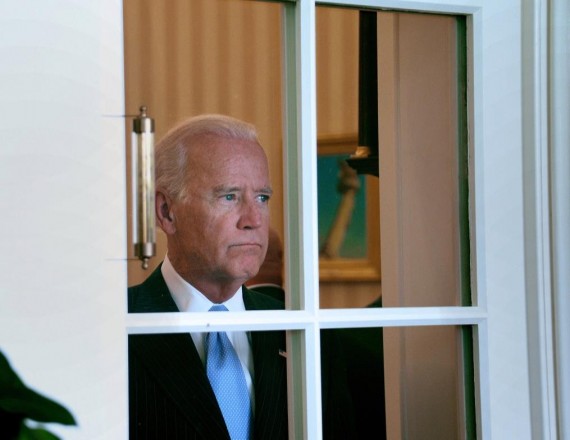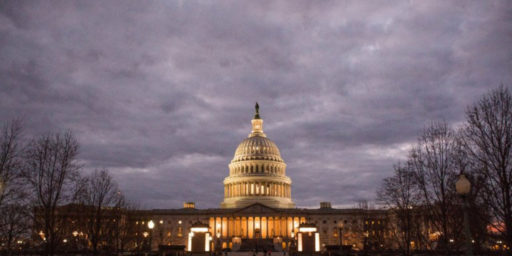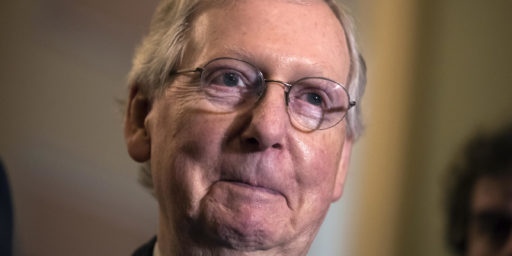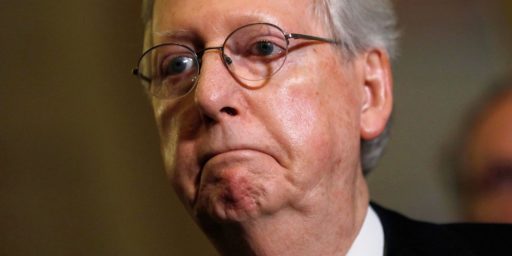Joe Biden In 1992: No Action On Supreme Court Nominations Until After An Election
In 1992, Joe Biden said that no action should be taken on any potential Supreme Court nominations until after that year's Presidential election. Sound familiar?
Conservatives opposed to consideration of a Supreme Court nominee to fill the seat vacated by the death of Justice Antonin Scalia until after the General Election and Inauguration of a new President are somewhat gleefully sharing this video released today by C-SPAN of a 1992 speech by then Senator Joe Biden, who at the time was the Chairman of the Senate Judiciary Committee, in which he spoke out against the idea of President George H.W. Bush filling any potential Supreme Court vacancy before an election:
During a 1992 Senate floor speech, Joe Biden said President George H. W. Bush should wait to fill any Supreme Court vacancies until after the presidential election.
“It is my view that if a Supreme Court Justice resigns tomorrow or within the next several weeks or resigns at the end of the summer, President Bush should consider following the practice of a majority of his predecessors and not, and not name a nominee until after the November election is completed,” Biden said at the time.
CSPAN on Monday posted a clip of the vice president’s remarks, given when Biden was serving as a Democratic senator from Delaware. The floor comments were made on June 25, months before the 1992 presidential election.
There were no vacancies on the Supreme Court at the time of Biden’s comments, but his remarks are sure to be scrutinized given the current debate about filling the court vacancy created by Justice Antonin Scalia’s death.
President Obama is expected to offer his nomination in the coming weeks, but Senate Republicans have given mixed messages over whether they will allow even a hearing on the nominee.
Several Republicans have argued that filling Scalia’s vacancy should be punted until after the 2016 election.
Democrats have argued that it would be wrong for the Senate to not hold hearings and votes on a nominee.
But Biden himself in 1992 said the Senate Judiciary Committee should “seriously consider not scheduling confirmations hearings on the nomination until after the political campaign season is over.”
“I sadly predict, Mr. President that this is going to be one of the bitterest, dirtiest presidential campaigns we will have seen in modern times,” he said. “I’m sure Mr. President, after having uttered these words some, some will criticize such a decisions and say it was nothing more than an attempt to save a seat on the court in hopes that a Democrat will be permitted to fill it.”
Here’s the video and transcript: (Transcript via The Volokh Conspiracy)
Sen. Joe Biden in 1992 says President Bush should "not name a nominee until after the November election…" #SCOTUShttps://t.co/setQGLzePt
— CSPAN (@cspan) February 22, 2016
It is my view that if a Supreme Court Justice resigns tomorrow or within the next several weeks, or resigns at the end of the summer, President Bush should consider following the practice of the majority of his predecessors and not, and not name a nominee until after the November election is completed.
The senate too, Mr. President, must consider how it would respond to a Supreme Court vacancy that would occur in the full throes of an election year. It is my view that if the president goes the way of Presidents Fillmore and Johnson and presses an election year nomination, the Senate Judiciary Committee should seriously consider not scheduling confirmation hearings on the nomination until ever — until after the political campaign season is over.
And I sadly predict, Mr. President, that this is going to be one of the bitterest, dirtiest presidential campaigns we will have seen in modern times.
I’m sure, Mr. President, after having uttered these words, some, some will criticize such a decision and say that it was nothing more than an attempt to save a seat on the court in hopes that a Democrat will be permitted to fill it. But that would not be our intention, Mr. President, if that were the course we were to choose as a senate to not consider holding the hearings until after the election. Instead it would be our pragmatic conclusion that once the political season is underway, and it is, action on a Supreme Court nomination must be put off until after the election campaign is over. That is what is fair to the nominee and essential to the process. Otherwise, it seems to me, Mr. President, we will be in deep trouble as an institution.
And here’s the C-SPAN Tweet itself:
Sen. Joe Biden in 1992 says President Bush should "not name a nominee until after the November election…" #SCOTUShttps://t.co/setQGLzePt
— CSPAN (@cspan) February 22, 2016
One could make the case, I suppose, that Biden’s remarks, coming as they did in June of the election year rather than February carry a different weight because they came far closer to the election than we stand today. At the same time, though, these remarks stand together with those made by New York Senator Chuck Schumer, the incoming leader of the Senate Democratic Caucus, in 2007 where he argued that the Senate should decline to consider a nomination sent by President Bush during the final year of his Presidency. They also stand as confirmation of my observation that, by and large, the propriety of an action such as the one Senate Republicans are contemplating in response to a potential nomination by President Obama depends largely on which side of the political argument you happen to fall at a given time. In 1992 and 2007, it was Democrats arguing that a Republican President should refrain from acting until the American people have had a chance to speak in an election. This time, it’s Republicans making that argument. The fact that neither President Bush had the opportunity to act during their final year in office on a Supreme Court vacancy meant that Democrats never had a chance to act, or refrain from acting, in response to the hypothetical nomination. The rhetoric used by two prominent members of their caucus at these respective times, though, makes it rather clear that they would have done so if they had the opportunity and that the political argument today would be quite different if the roles were reversed if it had been a prominent liberal member of the Supreme Court who had died suddenly and a lame duck Republican President seeking to replace them.







Considering how divisive the Thomas hearings were I’m not surprised that a year later one of the blowhard Senators who was criticized heavily for his treatment of Anita Hill would say this. It doesn’t really change how undivisive Obama’s picks were, and how completely unhinged and terrified the GOP has been. Right now, you’re talking about a party that’s about to nominate Donald Trump. They aren’t any parallels with the past. It’s kind of pathetic that this late in the game you need that to be the case.
Someday, there will be a nomination and hearings to fill the vacancy, it is my hope that this candidate, not be a graduate of Harvard, Yale or Princeton law schools, not be a member of the federal bench and not not from or living in the NYC or Wash DC metro area.
A former governor perhaps, a current or former prosecutor or member of a state supreme court. Maybe someone who isn’t even an attorney.
@Jim:
There has not been a non-attorney appointed to SCOTUS in more than 180 years. I doubt that will will ever happen again.
Your other points are well taken, though. Through both the Bush 43 and Obama appointments, SCOTUS has become almost exclusively an East Coast, Ivy League institution whose members are chosen from the Circuit Courts of Appeal (Kagan being the one exception to that rule). It didn’t always work that way. Anthony Kennedy graduated from Stanford and spent most of his career on the West Coast. Warren Burger was from Minnesota. Sandra Day O’Conner had spent some time in the Arizona State Legislature before being appointed to the State Supreme Court of Arizona. Even several members of the current Court, including the late Justice Scalia, have remarked that the Court would benefit from being chosen from among a wider field of candidates.
Yeah, the non attorney thought I knew was a reach, but the backgrounds of Kennedy, Souter, O’Connor and the courts I remember from the 60’s, 70’s and 80’s is what I would like to see the country return to.
Diversity is more than race, ethnic background and sex.
As you note late June != February. Late June in an election year means that hearings won’t happen until, at best September and more likley until after the election. For example, this year, the Senate is in recess from July 18th through September 6th – and then adjourns again on October 7th through the November 6th election.
As for Jim’s suggestion, one of the front runners, Sri Srinivasan is west coast educated, with a MBA (and JD) from Stanford.
@Jim:
Another point to consider.
Until Justice Scalia’s passing, there was a Supreme Court Justice who had grown up in 4 of the 5 boroughs of New York City. The only borough without a Justice was Staten Island.
Um…a hypothetical retirement less than 5 months before the election is not the position we are in now. Scalia is still dead.
In addition Biden said the President “…should consider…” not we will obstruct no matter what.
One of these things is not like the other.
So if Republicans do obstruct as threatened…what makes you think they are ever going to consider a Clinton nomination? You are endorsing, by not condemning their threat and/or endorsing an alternative, a government that will not work unless one party has control of the White House and the Senate. Then, when multiple vacancies are filled all at once, the selections will be so partisan and the swings so abrupt that the Court will lose all credibility.
Our Government works as much by traditions and norms as it does by laws. Absent those traditions and norms our Government doesn’t work.
Just like the economy…when you get exactly what you want…don’t whine about it.
And once again, clips out of context should be viewed with skepticism…
Video of Biden’s full remarks
In essence he was proposing that the hearings take place AFTER the election – not that they never take place!
In fact, just 10 minutes after calling for temporary inaction on Bush’s candidate, Biden actually promised to consider a moderate Supreme Court nominee.
C’mon now…we can’t have you refuting the “both sides do it” argument…tsk tsk…
@SKI: Stop introducing facts into Doug’s big “both sides do it” argument
@Jim:
Agree and also think the next justice needs some experience or at least knowledge of how the criminal justice system works in practice vs. how it works in theory. None of the current justices have any real experience of the criminal justice system and it shows in their decisions, which read more like Harvard faculty talking about the system should work rather than how it does.
One of the many reasons why my dream appointment would be Alex Kozinski (although that will never happen).
Talk is cheap Doug. The fact remains that since 1900 every president who named appointees in an election year got someone confirmed.
Steve
@Hal_10000:
Well, when I was at Harvard Law, there were multiple professors on the faculty who had extensive real-world experience as practicing criminal law attorneys, so they knew exactly how it worked. Ironically, federal appellate judges can be far more sheltered from the reality of criminal practice than supposedly sheltered professors are.
Please can we do away with this silly “both sides do it” crap. Wrong doing by A does not justify subsequent wrong doing by B. We citizens must insist on high standards by all elected officials. Let’s elevate our discourse and not allow the lowest barely legal actions become the default.
@Slugger:
Particularly when wrongdoing by A has never actually happened.
@C. Clavin: aLREADY LOST ALL CREDIBILITY AND THE PEOPLE ARE JUST PLAIN TIRED OF ANYTHING CONNECTED WITH DC
@Doug Mataconis:
This is a great point. I think part of having a “diverse” bench should be that they also grow up and are educated in various regions of the country – right now the court is essentially comprised of New Yorkers and Californians. We need to get away from only promoting people from the cities and schools that comprise the east and west coasts…
@pat maddin:
Some of the people are fed up with ALL CAPS
I don’t agree with Biden. Hamilton wouldn’t have agreed with Biden. There, I said it.
However, there is a difference between a president trying to stack the deck right before an election by negotiating a retirement on the Court, and a president replacing a justice who died or became incapacitated. The former president would be playing games, the latter would be doing his job.